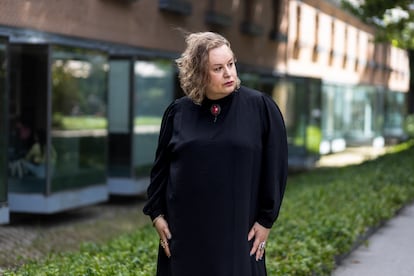De-classed women: Female writers take aim at the myth of upward social mobility
Led by southern European authors, a new wave of fiction focuses on class inheritance and the pitfalls of meritocracy


Beatriz, the protagonist of the novel Yeguas exhaustas [exhausted mares] knows why her parents never fantasized about her becoming a doctor or an engineer. “The only big sociocultural expectation they had of me was that I would do any job that didn’t involve cleaning someone’s toilet,” she reflects. In this first-person fiction about the female experience of de-classing, the daughter of a couple from rural Almeria, Spain, who migrated to Castellón (her mother, an orange picker and cleaner; her father, a factory worker), recalls her multiple class epiphanies from her childhood through when she became a writer and high school literature teacher.
“My life has been full of scenes that have brought me back to the matter of my origins, the fact of being rural and working class, again and again,” she says of her experience in the book’s opening pages. The panic of speaking the Valencian dialect in public while being a Spanish-speaker at home, the complexity of growing up with tapes of Spanish musicians like Camela and Marifé de Triana instead of Pink Floyd vinyl records and the reason she wrote “Fucó” in her notes the first time she heard about Foucault in college… the text opportunely weaves these seemingly ordinary and disconnected moments together. It’s an exercise in memory that exposes the cracks in the fantasy of social equality and aspirational merit-based middle-class advancement with which the daughters of the cheapest post-Franco labor force were mesmerized.

In her early thirties, Beatriz understands that “the school affords more vanity than salary, but vanity does not put food on the table.” Moreover, even if you get the best grades, there will always be “something that gives away your origins,” such as the daily act of eating a piece of fruit straight from the edge of the knife and not peeled from a plate. That act always “tickled” some of her university classmates who boasted multiple cultural references in class and, unlike her, were not the children of day laborers who ate in a hurry, with a knife, using one hand. Those kids — from whom she ended up feeling alienated rather than viewing them as equals — seemed destined to radiate “a naturalness in positioning themselves as someone who possesses and manages culture like they were born for it.”
The gap in the imaginary
There is something of Beatriz in the novel’s author, Bibiana Collado Cabrera, 38, with whom the protagonist converses in the book’s final section. “I had already done that in poetry books, but I wanted to delve into gender violence, the lack of reciprocation when you do everything that is expected, and the process still renders our genealogy invisible. The gap is not just economic but also in the imaginary: the horizon of expectations, the movies with which we have been raised and the music we listened to at home also makes us feel like we are still at the bottom,” she tells EL PAÍS over the phone.
Collado, the daughter of an orange picker and a tile worker, holds a degree in Hispanic philology and is a high school teacher in Valencia, Spain. She is making her debut in fiction after writing several books of poetry, the most recent of which is Violencia [Violence]. “I took the leap because I wanted a fictional pact to play with self-reference, but also to work on it so that it acquired the personal tone it has. The easiest thing to do would have been to become smug and conceited; the difficult thing in writing is to actually make it look easy,” she explains of her debut in this format.
The disillusioned women of southern Europe
A phenomenon among booksellers and book clubs thanks to word of mouth, exhausted mares ― whose title nods to that mother who has worked her ass off because she knows that “a poor man cannot afford to stop working or not work less than a single day of his life. One less poor thing”— is part of a new literary current, led by authors who seek to expose the traps and disappointments of those who grew up under the ideal of meritocracy and the promise of the social elevator through educational efforts.
If Irish bestsellers like Sally Rooney or Naoise Dolan have taken the lead in the class-conscious plot of love, authors from southern Europe have chosen to investigate their disenchantment through family genealogy. Like the Basque Eider Rodríguez in Material de construcción (Construction material), a “non-fiction novel” as she herself defines it, in which she writes about her own declassification and the shame associated with that process while dissecting the figure of an alcoholic father. In Italy, the trend is similar.
Claudia Durastanti’s Strangers I Know tells the survival story of her parents (both mute and of humble origins, like the author) as she interacts with her supposed equals in creative environments. She writes: “I keep asking myself how much rent they pay, or what work they do to stay here, in a stubborn resistance that confuses me and is turning me into a different creature, whose voice, way of gesturing and dressing I cannot stand.” The heroine of Lake Water Is Never Fresh, the latest novel by Giulia Caminito, a Premio Strega award finalist, is also frustrated at not being able to prosper. This family drama about class immobility was not translated into English in the United States because it “challenges the American dream.” In it, a mother (Antonia) hopes that her children can overcome their hardships through education, while the daughter (Gaia), remains trapped at a disadvantage without any opportunity for working-class advancement, despite her academic efforts.
In an e-mail exchange, Caminito, 35, who was raised in Rome by librarian parents, clarifies that her goal was to render visible the generational disenchantment with institutions and academia as the supposed motors of prosperity. “Until my parents’ generation, studying and going to college meant making a valid investment of time, money and commitment to achieve [positive] results in [one’s] work and material conditions. It was an investment in the future, hope for one’s own advancement. Objectively, that is no longer the case today,” explains the author, who had previously examined the idea of well-being and those who are excluded from enjoying it in her previous novels, La grande A (The Big A) and Un giorno verrà (It Will Come Someday).
The sad de-classing process
Spaniard Alana S. Portero, 45, was also obsessed with writing about the genealogy of class as seen through the eyes of invisible women. She has done just that in La mala costumbre (Bad Custom), her debut novel with which she revolutionized the Frankfurt Book Fair. The book drew inspiration from the anecdotes of her mother, her aunts and neighbors in San Blas, the neighborhood of Madrid where she grew up. “They are women I admired, fascinated, from a distance, the ones who tell you [your] origins in a fair story, plainly and sincerely, without embellishment,” she says. With her novel, the author wanted to “offer a class counter-narrative to all the hyper-masculinized narratives that have ignored the fact that women sustained workers’ consciousness. They could be in protests and political struggles, but they could do [that] because they took care of their children and provided for them, working in gratuitous conditions, which they never tolerated in their jobs,” she adds.

According to the Spanish writer, if there is anything that unites this new generation of female authors writing about social inequalities in their fiction, it is the discussion of de-classing approached from the perspective of sadness: “We feel that we have been robbed of the story and the possibility of having better memories. We don’t say: it’s a good thing we left the neighborhood. We have left that neighborhood, but to go on to another one. We are not looking for nostalgia, which is reactionary and treacherous; if we tell the story of this evolution, it is from the point of view of grief.”
The author believes that this new wave of fiction is a reaction to the absence of class perspective in much of the fiction by previous generations of female writers. “I don’t know about the rest, but I found it lacking in the authors I still revere, such as Carmen Martín Gaite, Carmen Laforet and Rosa Montero. I think Elvira Lindo was one of the few who addressed the class narrative in a less touristy way,” she says. She adds that the current change is real: “I also notice it in the reception within the cultural sphere itself; there is a change that [makes it] a little less bourgeois.”
Sign up for our weekly newsletter to get more English-language news coverage from EL PAÍS USA Edition
Tu suscripción se está usando en otro dispositivo
¿Quieres añadir otro usuario a tu suscripción?
Si continúas leyendo en este dispositivo, no se podrá leer en el otro.
FlechaTu suscripción se está usando en otro dispositivo y solo puedes acceder a EL PAÍS desde un dispositivo a la vez.
Si quieres compartir tu cuenta, cambia tu suscripción a la modalidad Premium, así podrás añadir otro usuario. Cada uno accederá con su propia cuenta de email, lo que os permitirá personalizar vuestra experiencia en EL PAÍS.
¿Tienes una suscripción de empresa? Accede aquí para contratar más cuentas.
En el caso de no saber quién está usando tu cuenta, te recomendamos cambiar tu contraseña aquí.
Si decides continuar compartiendo tu cuenta, este mensaje se mostrará en tu dispositivo y en el de la otra persona que está usando tu cuenta de forma indefinida, afectando a tu experiencia de lectura. Puedes consultar aquí los términos y condiciones de la suscripción digital.








































